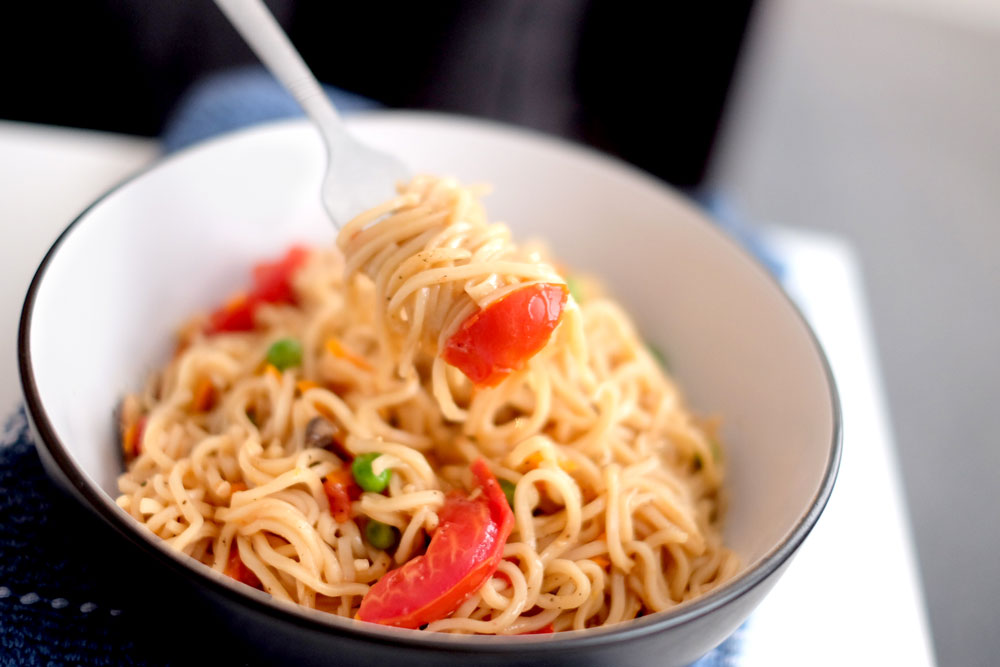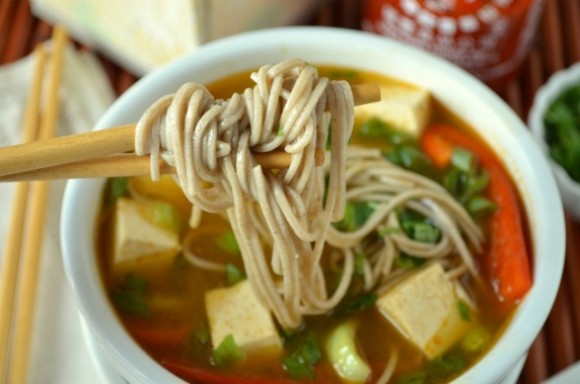Pot Noodles, despite their convenience, might not be an ideal choice for those aiming to lose weight. These instant noodles are typically laden with high calories, saturated fats, and elevated sodium levels, while lacking essential nutrients crucial for a balanced diet, such as vitamins and fiber. Moreover, they are heavily processed and contain additives and preservatives, which can potentially impact overall health negatively.
Their lack of satiety is another concern; owing to their low protein and fiber content, they may not keep you feeling full for long, potentially leading to increased hunger and subsequent overeating.
Relying on Pot Noodles as a primary meal source could result in nutritional deficiencies, given their imbalanced composition. Therefore, a better strategy for weight loss involves opting for whole, unprocessed foods rich in nutrients, such as vegetables, lean proteins, whole grains, and fruits.
How do Pot Noodles’ Nutritional Components Impact Weight Loss?

It’s generally recommended to focus on a balanced diet that includes whole, minimally processed foods rich in nutrients and fiber. These foods help in keeping you full longer, regulating blood sugar levels, and supporting overall health.
High Calorie and Fat Content
Pot Noodles typically contain a high number of calories, primarily derived from refined carbohydrates in the form of noodles and often from added fats in the seasoning or sauce packets. These refined carbs can cause rapid spikes in blood sugar levels, leading to increased hunger shortly after consumption. Additionally, the fat content in these noodles, particularly saturated fats, contributes to their high calorie count, which may not align well with weight loss goals.
Elevated Sodium Levels
One of the most concerning aspects of Pot Noodles is their high sodium content. Excessive sodium intake is associated with water retention, which might result in temporary weight gain. Moreover, a diet high in sodium can contribute to hypertension (high blood pressure) and other cardiovascular issues, making it an unfavorable choice, especially for those monitoring their health and attempting to lose weight.
Lack of Essential Nutrients Like Vitamins and Fiber
Pot Noodles often lack essential nutrients crucial for a balanced diet. They typically lack significant amounts of vitamins, minerals, and fiber. Vitamins and minerals are essential for various bodily functions, while fiber aids in digestion, promotes satiety, and supports weight loss by slowing down the absorption of sugars.
Presence of Additives and Preservatives
These instant noodles contain numerous additives and preservatives to enhance flavor, texture, and shelf life. These additives may include monosodium glutamate (MSG), artificial colors, and flavorings. While these additives may improve taste and convenience, they can have adverse health effects for some individuals and may not support a healthy weight loss plan.
What is the Impact of Pot Noodles on Weight Loss?
While occasional consumption of Pot Noodles might not derail weight loss efforts, relying on them as a staple in your diet could hinder progress. The high calorie, low-nutrient content combined with refined carbohydrates and potentially unhealthy fats can make it challenging to achieve sustainable weight loss.
Limited Satiety due to Low Protein and Fiber
Pot Noodles often lack sufficient protein and fiber, two crucial components that contribute to feelings of fullness and satiety. Protein helps regulate hunger hormones, keeps you feeling full for longer periods, and supports muscle maintenance during weight loss. Fiber adds bulk to your diet, slows down digestion, and promotes fullness. The low levels of both in Pot Noodles mean that despite consuming a meal, individuals may feel hungry again shortly after, leading to potential overeating or snacking.
Potential for Increased Hunger and Overeating
Due to their inadequate protein and fiber content, Pot Noodles might not provide sustained energy or a feeling of fullness. This can result in increased hunger and cravings for more food shortly after consumption. Consequently, individuals may consume additional calories, leading to a surplus that hinders weight loss efforts.
Imbalanced Meal Composition Leading to Nutritional Deficiencies
Relying on Pot Noodles as a primary meal source may lead to an imbalanced diet deficient in essential nutrients. Their lack of vitamins, minerals, and other micronutrients can potentially result in deficiencies, impacting overall health and potentially hampering weight loss progress. Over time, consistently consuming such imbalanced meals can lead to nutritional deficiencies, affecting various bodily functions and overall well-being.
How Do Pot Noodles Compare to Healthy Alternatives for Weight Loss?

Pot Noodles are often considered a less healthy option due to their high sodium, high calorie, and low-nutrient content. When comparing Pot Noodles to healthy alternatives for weight loss, there are significant differences in nutritional value and impact on weight loss efforts.
Advantages of Whole, Unprocessed Foods
Whole, unprocessed foods offer numerous advantages over Pot Noodles. They are typically rich in nutrients, including vitamins, minerals, antioxidants, and fiber. Unlike processed foods like Pot Noodles, these foods undergo minimal processing, retaining their natural nutritional value. Whole foods also tend to be more filling due to their higher fiber content, promoting satiety and reducing the likelihood of overeating.
Nutrient-Rich Options such as Vegetables, Lean Proteins, Whole Grains, and Fruits
Incorporating vegetables, lean proteins, whole grains, and fruits into the diet provides a wide array of essential nutrients. Vegetables offer vitamins, minerals, and antioxidants, while lean proteins (like chicken, fish, legumes) support muscle maintenance and aid in satiety. Whole grains (such as brown rice, quinoa, whole wheat) are rich in fiber and provide sustained energy. Fruits offer vitamins, minerals, and natural sugars in addition to fiber.
How Healthier Alternatives Support Weight Loss and Overall Health
Opting for healthier alternatives over Pot Noodles can significantly support weight loss and overall health. Whole, nutrient-dense foods tend to be lower in calories while providing essential nutrients, which can aid in weight management. Their high fiber and protein content promotes feelings of fullness, reducing the chances of overeating and snacking between meals. Moreover, the vitamins, minerals, and antioxidants in these foods support various bodily functions, boosting overall health and immune function.
FAQ’s
What noodles are low calorie?
Shirataki noodles, zucchini noodles (zoodles), or konjac noodles are examples of low-calorie noodle alternatives.
How much fat is in Pot Noodles?
Pot Noodles typically contain around 10-20 grams of fat per serving, depending on the flavor and variety.
How many calories should I eat a day?
Daily caloric intake varies based on factors like age, gender, weight, activity level, and goals, but an average adult might aim for around 2,000 to 2,500 calories per day.
How much fat should I eat per day?
The recommended daily intake of fat is approximately 20-35% of total daily calories, which might translate to 44-77 grams of fat for a 2,000-calorie diet.
Do Pot Noodles have a lot of calories?
Yes, Pot Noodles tend to be relatively high in calories, often ranging from 300 to 500 calories per serving, depending on the flavor and type.
How many calories should a woman eat?
The recommended daily calorie intake for women varies based on factors like age, weight, height, activity level, and goals, but it generally ranges from 1,600 to 2,400 calories per day.
Final Words
Pot Noodles might not be the best pick if you’re trying to lose weight. They’re high in calories, fats, and sodium but low in the good stuff like vitamins and fiber that help keep us healthy. Eating these noodles might not make us feel full for long, which can lead to wanting more food later.
Plus, relying too much on them could mean we miss out on important nutrients our bodies need. Instead, choosing foods like veggies, lean proteins, whole grains, and fruits is a better idea. These foods have lots of good stuff that keeps us full and helps our bodies work well. They’re lower in calories and higher in nutrients, making them a smarter choice for losing weight and staying healthy.

